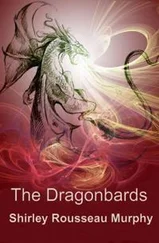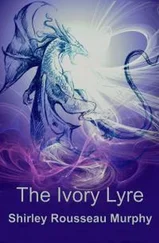Down the crow swoops, lighting on top of Jana’s clothes and cocking his head. The locket shines brightly. When Jana sees him she shouts, but it is too late. He leaps into the air, the locket dangling from his polished beak.
Jana climbs from the trough and grabs a stone to throw just as John comes around the corner of the barn. He grabs the rock, Jana’s hand still around it. “What are you doing?”
“He has my locket,” wails Jana.
“Well, what did you take it off for?” asks John, frowning at the dripping little girl. “To swim.”
“So I see! But you can’t throw a rock at him! He doesn’t know it’s wrong. You shouldn’t have left it, Jana.”
“I can too throw a rock,” shouts Jana, jerking away and raising her arm.
“Well, you can, but you won’t hit him,” says John, stepping back.
“I will, too!”
“Besides, he’s in his own place. It’s not your sky!”
“Not his either!”
“More his than yours!”
“It’s not! It’s God’s sky. And my locket!”
“And God’s bird, Jana!”
“If God made that old crow, he didn’t mean for him to steal my locket!”
“All the same, God’s sky, and God’s bird, too,” says John, going into the house and leaving Jana to her own devices.
Lisa has returned, and comes up behind Jana, quiet for once. She still has her own locket. Jana eyes it. Lisa goes quickly into the house, following John.
The crow sits in the willow tree for a long while, then flies to a tall pine, hiding the locket securely in his nest.
Jana glares. It is a very tall tree.
CHAPTER 15
No one loses five horses, with snow and plenty of mud to show their tracks, without going after them. It is among the rocky cliffs that the trail finally vanishes, and Mr. Elber must go home. He does all the proper things, notifying the ranchers along the way, the rangers, and the police. He knows why horses leave their pastures in the springtime when they are far from home, and he calls Portland, saying, “Watch for them in a couple of months. They should be there by then—if they make it.”
All along the way men are alerted to the passing of the horses, and riders watch the hills as they go about their work. And all along the way the horses, blessed with some impossible luck, travel under the noses of those who search for them.
On a low hill, hidden by bracken and flowering bushes, the tramp sits, watching the great white barn and the ranch house, watching the roads that lead to them. He is eating beans from a can and drinking coffee, while over a tiny fire, green cattails are boiling. He has watched the barn for many weeks, moving off across the country sometimes, then coming back to it.
The ranch has been quiet since yesterday evening, when the red truck pulled into the barn, then left a few minutes later. There has been shouting once or twice, faintly heard, and this morning, before it was light, the tramp made his way down to the barn, looked into the deserted, muddied stalls and the feed room, and poked about here and there, returning to the hill just in time to avoid being chased away, or worse.
The cattails smell good, and when they are done he picks one up, blows on it, and chews on it like an ear of corn. I wonder how they knew all that, he thinks, remembering the children. He has not had the nerve to try cooked flowers, but he may. He may. He’s glad the crow has not returned this time; he is such a noisy bird.
“It’s so lovely here, I can’t believe it’s real,” Karen says one evening as she and Tom walk barefoot along the edge of the surf, watching the sun go down. “And yet it seems as if we have always been here, as if we have known the Tillmans and Sarah Paddyfoot forever. And Bo, too,” she says as the hound shakes a spray of ocean over them.
“Too good to be real,” Tom says. “Do you think it is only one of your dreams, after all?”
“I hope not. What will we do when school starts, Tom? It frightens me to think of it.”
“Mr. Tillman said he’d figure out something, and somehow, I’m sure he will. I don’t know,” he continues, “he makes me feel as if he could take care of anything. Even school. I must talk to him about it, though. He says”—Tom pauses to pick up a shell— “he says my carpentry is as good as John’s, that you and I have been a good bit of help.” He hands the shell to Karen and watches Bo leap into the surf. “We’ll think of something, before school starts,” he promises.
After many weeks Kippy and his band come down the last valley, cross the last field, and stand gazing at the sea. Kippy looks for a long time, then lies down and rolls. He gets up snorting and begins to play; he chases the pony, then bucks off toward the beach, shying back when he reaches the sand and returning to graze with the others.
They begin to move up the coast, having many times to go back and around fenced pastures, or out onto the beach at night when they cannot be seen. There is plenty of grazing, the going is good, and they should make good time, but Tolly is growing very slow, holding them back. Some days she is eager to move ahead, and will swing heavily along beside Kippy for a while; more often she will not move at all, but puts back her ears and will not tolerate Kippy’s nipping. But Kippy does not nip so hard; he is growing more careful. This is strange; he does not want to badger her as before. There is something different about her. What is it, Kippy? You are only a small, ornery gelding—What do you know about colts? Nevertheless, he is tender with her, and lets her set the pace, choosing whether to travel or to loaf along and graze. At least he is by the sea, and the meadows are green.
In a small apartment in San Francisco a redheaded young lady sits at a card table before the fire eating her dinner. She is small and fine-boned, with a golden hue to her skin. On the card table, besides an omelet and a salad, a cup of coffee and a half-eaten roll, is a pile of books, a map, and an untidy stack of letters. On the couch, facing her, sits her yellow cat, Abbey, watching her.
“I will teach,” says Mary McCamley, “in the smallest village there is, where all the children come to one room, and help each other learn; a place where the sea roars and the sun shines and the storms are the wildest storms you’ve ever seen, Abbey!” She puts down her coffee cup and looks across at the cat intently, as if waiting for an answer. Abbey blinks. “We will have a cottage there,” Mary McCamley continues, “for the two of us, Abbey.” She pauses, then pours herself more coffee. Abbey blinks again, and yawns.
One morning Kippy raises his head and puts up his ears. There is movement on the hill across the stream, and as he watches he sees a herd of ponies slipping through the scrub trees and the tall grass on the hill, silent as cats. It is very early; they are coming to drink. No tame horses, these, Kippy knows. They move differently. They are alert, wary.
There is a great band of them. Mostly roans and grays they are, sand-colored, half hidden in the browning grass. They are hardy little things, no bigger than Kippy. The leader has seen Kippy and pauses. The wind is the wrong way and he can’t smell if there is man near, but these are strange horses. His ears are back; he turns, and the other ponies, obedient and wary, turn with him. Soon they are gone.
Across the mountains Mr. Elber has had a message. “We’re not sure, yet,” says the sheriff. “We have some wild horses here, and it could be them, but one of the farmers swears he’s seen some big horses, bigger than these wild ponies.” He pauses. “What’s that? Sure! Sure I will, first thing I know any more. I’d like to catch the whole bunch of wild ones, too, while I’m at it. What’s that? Oh, yes, whole flock of ‘em. Cute little things, but a bother, running loose-folks here think they bring luck, or some such thing. Trample a lot of gardens, those ponies do. What’s that? Yessir, we’ll catch those critters if they’re yours, all right. Let you know right away.”
Читать дальше
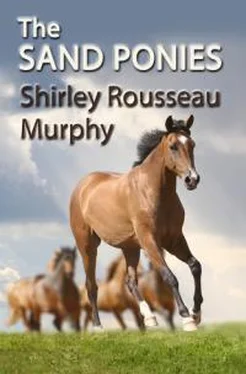
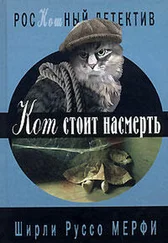
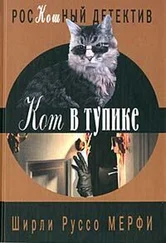
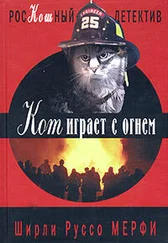

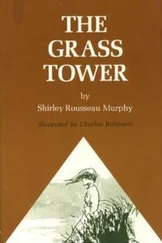
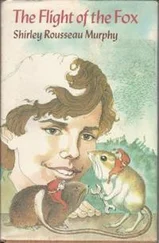
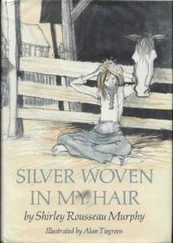
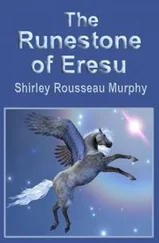
![Ширли Мерфи - The Shattered Stone [calibre]](/books/436059/shirli-merfi-the-shattered-stone-calibre-thumb.webp)
